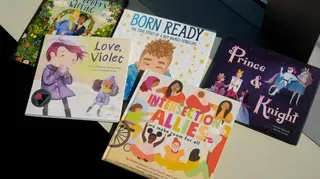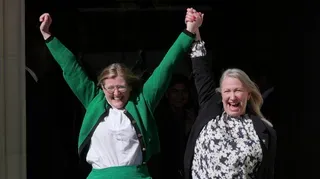October 8, 2012
The Last Closet Encourages Pro Sportsmen to Support Gay Athletes
Holly Grigg-Spall READ TIME: 4 MIN.
In an effort to help end homophobia in professional sports, and to provide good role models to LGBT youth at risk for suicide, The Last Closet is encouraging pro athletes to support their gay teammates. Via a series of video interviews and social media campaigns, they hope to encourage commissioners to provide a friendlier atmosphere for gay athletes to come out.
"We believe they do want to support gay players, they just don't know if this is the right time to make that public. They need to be convinced," said Fawn Yacker, co-founder of The Last Closet. "With the military changing its policy and the President voicing his support, this would be the perfect time. So far each Commissioner has got 300 letters. To see the Commissioners faces, see them say those words -- it's important."
In 2000, Yacker and Dee Mosbacher released their documentary "Training Rules," an examination of homophobia in women's collegiate sports, to critical acclaim. In the aftermath of this success the filmmaking team turned their attention to men's professional sports. They discovered that to date, not one professional player in the top five U.S. major sports of football, baseball, basketball, hockey and soccer has come out while still actively playing.
During their research, Yacker and Mosbacher came to understand that many members of the sports hierarchy would not talk to them for such a documentary. They resolved to secure interviews, and founded their online project, The Last Closet, with the aim of encouraging gay pro-sportsmen to be open about their sexuality.
The campaign asks that the sports-loving public send letters to the League Commissioners via their website, and send tweets to their Twitter pages that ask them to answer on camera two questions: Would you invite the gay players in your league to come out, and what support systems would you have in place for them once they do?
In the following months, these efforts will be concentrated on sports agents, sports writers and the players themselves. The commissioners addressed for the next two months are David Stern of the NBA, Roger Goodell of the NFL, Bud Selig of the MLB, Gary Bettman of the NHL and Don Garber of the MLS.
"Athletes are our national heroes. That none have taken the courageous step to 'come out' sends a distinctly negative message to our youth. Just one professional player saying the words, 'I'm a pro athlete and I'm gay' would profoundly contribute to the emotional health of those young people without heroes of their own in major professional sports," reads the letter sent to the commissioners.
Outsports & Out LGBT Teen Athletes to Interview Pro Players
"Gay pro-athletes are afraid of the unknown. They think they don't know what will happen if they come out. But we do know what will happen," said online gay sports community Outsports Founder Cyd Zeigler, who has championed the campaign.
"The media and the fans will respond positively. He won't be dropped by his sponsors," he said. "Most of the teammates will be supportive. Athletes have just 3.5 years for their career and many don't think outside of the sport, they don't open their eyes. They have like a 1 percent chance of losing from deciding to come out while they're still playing."
Zeigler will be conducting the interviews as they are scheduled, although, as yet, every commissioner has refused to cooperate. Yacker has also recruited two teen interviewers, out gay high school athletes themselves, to assist Zeigler with the interview process. Galen Dodd is a 16-year-old volleyball player and Grady Schroeder is a 17-year-old track runner.
"We want the interviewees to feel like the interview is a collaborative project. We don't want them to feel they are being forced. They will be presented in the best light as people who came forward to make a difference," said Yacker.
The hope is that, with a number of testimonies, currently closeted gay players will see that it is safe to be open and honest. The first might not be a star athlete but someone out of the spotlight and there's the possibility their decision will increase their notoriety and gain them sponsorship. Alternatively a star player will decide his powerful position will make it easier for him to lead the way for others.
The campaign is also asking that athletes, coaches and fans in the general public submit their own video testimonies through the campaign website to show support for ending homophobia in sports and suggest their own questions for the interviewees.
"We need to redefine what it means to be a sports champion. Athletes win championships with their teams, not alone. To be a hero you need to embrace your status as a role model and uplift people," said Zeigler.
For more information, visit www.thelastcloset.org







